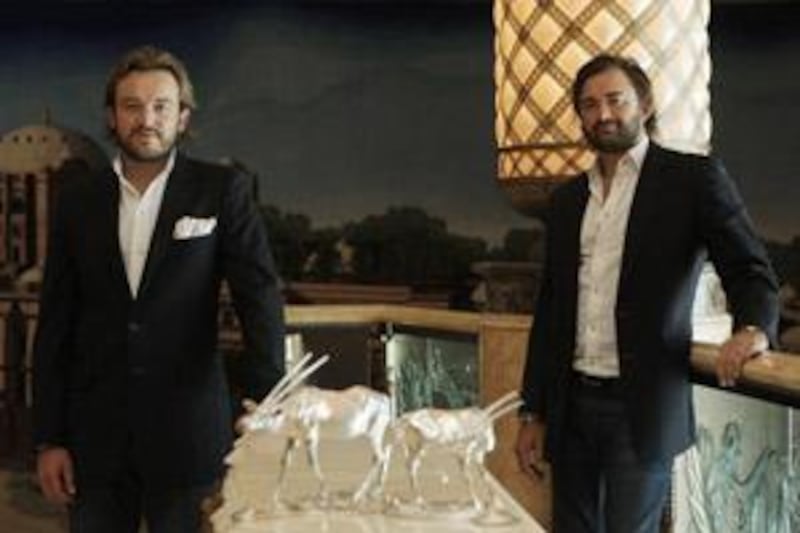Alexander and Forbes Mavros are not, it is fair to say, the archetype of African jewellers. Dapper, groomed and urbane, in well-cut blazers and pressed jeans, the brothers (two of Patrick Mavros's four sons) are in Abu Dhabi to catch up with their company's Middle Eastern clientele at the ADIHEX show this weekend. But when they whip out a family portrait (OK, it's a Christmas card) of the whole clan wearing safari-chic khakis in the Paradise Valley, Nyakasanga, Zimbabwe, the picture becomes a little clearer. Alexander may live in London, running the Fulham Road boutique, while Forbes resides in Mauritius overseeing the jewellery production (he trained in jewellery design at Edinburgh College of Art), but the fifth-generation Zimbabweans' hearts are in the wide, sunbleached panoramas of Africa, where they grew up.
And what a fascinating upbringing it must have been. The children of a wildly talented, entirely self-taught sculptor and jeweller, scions of the oldest European family in Zimbabwe, the family ranch housed orphaned elephants and hosted visits by dignitaries from Prince Charles to Bruce Springsteen. Who wouldn't choose to follow in the footsteps of a family like that? "There was never any pressure," says Forbes, 29. "We were always encouraged to do what we were passionate about, but I think genetically we were conditioned to go into the business. We grew up on the farm running around barefoot, following Dad around on the atelier and helping him, aged three and four, making wooden swords in the workshop with the craftsmen. It was always in our blood."
It is perhaps this atmosphere of freedom and creativity that makes the objets, accessories and jewellery of Patrick Mavros so very joyous. Mavros himself began his business by accident when, ill in bed, he was given a piece of ivory and a chisel by his uncle. He proceeded to carve it into a pair of earrings for his fiance Catya (the family's matriarch). When she wore them, her hairdresser begged for him to make a pair for her, and her customers followed suit. Realising that ivory was an unsustainable material, he moved his production to silver and a huge market opened up. Now Patrick Mavros has shops in Botswana, South Africa, London, Tanzania, America and clients all over the world, with pieces in the collections of royalty, such as the Sultan of Oman, the King of Spain - not to mention Hollywood stars, including Denzel Washington.
The sweet tale behind those earrings is characteristic of backgrounds of many pieces in the collection, from the tiniest silver elephants (such as the ones based on the farm's orphan elephants) to the grandest candelabra table settings. "He didn't design them to wow adults," explains Alexander, 30. "He designed them for families, because he thought about what it was like to be a child sitting around an adult's dining room table, so while the parents have their guests and the drone of adult conversation is washing over the children's heads, they're transfixed in this magical animal kingdom, with elephants walking across the table and the trees growing up out of the table. It was a fantastical thing."
The Mavros family goes beyond bloodlines, to the Zimbabweans who work in the Mavros atelier - a community success story in a country that has recently endured more than its fair share of strife. "We're very proud of our country," says Alexander. "It's gone through a tough time and there have been a lot of obstacles that we've had to face. Dad is a great leader because he always says to turn disadvantage into complete advantage, and we've been fortunate in being able to come up from some pretty tough times."
"Over the years we've developed a community, a family, a village on our farm, of highly skilled Zimbabwean Shona craftsmen," adds Forbes, "and they're very much a great and celebrated part of our business. Our skilled craftsmen are Zimbabweans who live on our property, there's a local school and it's really a self-sustained unit. It's a great story of a community success." As for Mavros's sons, their own design contributions, such as Forbes's silver elephant-hair bracelet ("It's based on the iconic African design, where elephant tails were woven in intricate patterns and given as gifts of brotherhood and friendship to imbue the wearer with good luck when they're travelling across Africa," explains Alexander) have brought a new, more indigenous aesthetic to the brand, and their cosmopolitan upbringings have inspired a new vision for the company.
"You look at the Americas, you look at Europe, you look at the rest of the world and everyone has the pinnacle of luxury, whether it's Tiffany's or Hermès or Boucheron or Bulgari," says Alexander. "And you think of Africa, which is the one continent with so much mystique and intrigue and romance, and it has nothing to offer the world of luxury. It's our mission to create the first definitive African luxury brand."
It's a big journey, but it looks like the elephant-hair bracelets that both brothers wear are already working their magic.





